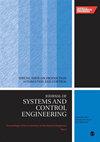Adaptive backstepping-extended state observer control for electrohydraulic position servo systems with multiple disturbances using the compound friction compensation
IF 1.4
4区 计算机科学
Q4 AUTOMATION & CONTROL SYSTEMS
Proceedings of the Institution of Mechanical Engineers, Part I: Journal of Systems and Control Engineering
Pub Date : 2023-12-07
DOI:10.1177/09596518231209222
引用次数: 0
Abstract
Multiple disturbances coming from friction, matched, and mismatched uncertainties make it difficult for electrohydraulic servosystems to obtain the satisfactory position-tracking performance. The existing adaptive backstepping controllers fail to effectively distinguish the difference of disturbance between the mechanical subsystem and the hydraulic subsystem, which limits the compensation effect of multiple disturbances, especially for friction nonlinearity. Therefore, the adaptive backstepping-extended state observer position-tracking controller combined with compound friction compensation is proposed to simultaneously compensate for the fast-varying friction disturbance of a mechanical subsystem and the slow-varying matched disturbance of a hydraulic subsystem. The extended state observer algorithm is integrated into the adaptive backstepping controller to suppress the null bias of the average tracking error. The compound friction compensation includes a LuGre model-based compensation and a high-order disturbance observer, which can improve the tracking performance of system and avoids the excessive gain of observer. A large number of comparative experiments are conducted to verify the effective of the proposed controller.利用复合摩擦补偿对具有多重干扰的电液位置伺服系统进行自适应反步进-扩展状态观测器控制
由于摩擦、匹配和不匹配等不确定因素的干扰,使得电液伺服系统难以获得满意的位置跟踪性能。现有的自适应反步控制器不能有效区分机械子系统和液压子系统之间的扰动差异,限制了多重扰动的补偿效果,特别是对摩擦非线性的补偿。为此,提出了结合复合摩擦补偿的自适应反步-扩展状态观测器位置跟踪控制器,以同时补偿机械子系统的快变摩擦扰动和液压子系统的慢变匹配扰动。将扩展状态观测器算法集成到自适应反步控制器中,以抑制平均跟踪误差的零偏差。复合摩擦补偿包括基于LuGre模型的补偿和高阶干扰观测器,可以提高系统的跟踪性能,避免观测器增益过大。通过大量对比实验验证了所提控制器的有效性。
本文章由计算机程序翻译,如有差异,请以英文原文为准。
求助全文
约1分钟内获得全文
求助全文
来源期刊

CiteScore
3.50
自引率
18.80%
发文量
99
审稿时长
4.2 months
期刊介绍:
Systems and control studies provide a unifying framework for a wide range of engineering disciplines and industrial applications. The Journal of Systems and Control Engineering refleSystems and control studies provide a unifying framework for a wide range of engineering disciplines and industrial applications. The Journal of Systems and Control Engineering reflects this diversity by giving prominence to experimental application and industrial studies.
"It is clear from the feedback we receive that the Journal is now recognised as one of the leaders in its field. We are particularly interested in highlighting experimental applications and industrial studies, but also new theoretical developments which are likely to provide the foundation for future applications. In 2009, we launched a new Series of "Forward Look" papers written by leading researchers and practitioners. These short articles are intended to be provocative and help to set the agenda for future developments. We continue to strive for fast decision times and minimum delays in the production processes." Professor Cliff Burrows - University of Bath, UK
This journal is a member of the Committee on Publication Ethics (COPE).cts this diversity by giving prominence to experimental application and industrial studies.
 求助内容:
求助内容: 应助结果提醒方式:
应助结果提醒方式:


